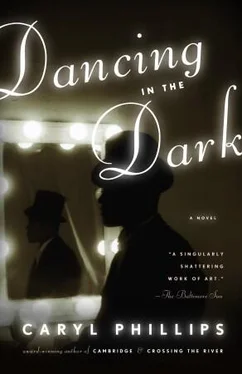Bert falls into the habit of leaving Clyde D’s Bar late at night and wandering the streets of his city on bruised and swollen feet until the sun comes up. He observes the colored citizens of New York going about their night business, and he studies them, he looks at their posture, listens to how they speak to one another in short excitable bursts, and he observes their often flamboyant hand gestures. These days there are many who don’t recognize him, including those who have arrived fresh off the trains from the south and who might be familiar with his name, but who certainly don’t know his face. The sight of this tall, heavyset, lightskinned man ambling around the streets of Harlem shod in carpet slippers only arouses feelings of pity in the hearts of those who look on. Why is this slow-moving man not home and tucked up safely in a warm bed? What can he be looking for out here on these early-morning streets? As he passes by strangers he smiles at them, for he is a booster for New York and he loves the way the city rises toward the sky, he loves the Brooklyn Bridge, the coalpowered elevated trains, the noise, the dirt, the rivers alive with their multitude of craft; this is his city, and these are his people, and as he walks he imagines that in its perversely detached way New York City understands him, but eventually sleep invades his tired limbs and he finds himself at the top of the short flight of steep steps that lead right up to his door, and he pauses for a moment and then slowly turns around and looks out on a lamplit Seventh Avenue knowing that tonight he has once again beheld the three stages of dawn. First, he witnessed the accidental leakage of light that hardly altered the darkness. Second, he saw the blackness turn a dark, royal blue. And finally, as he entered his block, he could see green leaf against brown trunk, and he stands now and observes the door handle distinct from the door, and the individual colors of Mother’s drapes in the windows, and then the streetlamps blink off and the avenue is now once again illuminated by the reliable light of the day, and soon he will be able to ease the slippers from his swollen feet.
When he wakes up he realizes that the sun is shining directly into his face. He levers himself upright on the sofa in the library and he notices that Mother has already placed the daily newspaper in his lap. These days this early-morning exchange represents the true extent of their intimacy, and he feels powerless to improve upon it. He has dreamt that he was back on the road leading a new company that comprised just himself, George, and Aida, and every city they played in they broke box office records. Strangely, he remembers that the audience in the stalls contained only colored folks, while the white people sat upstairs in the balcony and looked on somewhat cautiously. Of course, the most important thing of all was the fact that there was no makeup upon his face. George danced a graceful jig and looked over and smiled at him, and then he woke up and discovered that the sun was shining directly into his face and that his wife had carefully placed the daily newspaper in his lap.
He looks from one face to another eager to ask them why they are staring down at him in this fearful manner. In fact, why are they standing over him? Their mouths are moving but he can hear nothing except the sound of the sea rushing around in his head, rising and falling, the waves lapping gently from one side of his nappy wig to the other. Every face is white. He remembers. His company is all white and they are on the road, at the Garrick Theatre in Detroit, with his new production, Under the Bamboo Tree . It is 1922 and Bert has made a comeback. Bert Williams is producer, star, and leader of a new company, but without George this is futile. The box office is weak, and he is sick and incapable of dressing himself, and the door to his mind is ajar, so much so that he seems to have little control over who or what wanders in, but he understands that he must continue for without him there will be no show, yet there is an aspect of horror on the faces of those who look down at him for clearly they see something that has shocked them. He had thought seriously about formally announcing his retirement, but he finally admitted to himself that his short journey from his library to Clyde D’s and back again was disrupting his soul, and so after two years his wife was happy when against all expectation he tore up the numerous drafts of his “retirement” press release, and he announced that he would be forming a new company and touring the country with a traditional type of show. However, it quickly became clear, both to his company and to paying audiences, that Bert Williams had underestimated the pressures of leading a company, and he began to struggle through performances, and sweat cried from his armpits the moment he left the quiet of his dressing room, and his joints jerked to little purpose when he attempted to dance for his whole rig was rusted over, and at the conclusion of each evening he could no longer bow deeply, or smile broadly, or bathe in the luxury of applause. Soon his wife was begging him to return home to New York and admit that his body and mind could no longer take this beating, but he decided to persevere, and now, above him, the circle of white faces begins to spin like a child’s top and he closes his eyes and the world fades to black. He remembers completing the matinee and so this must be the evening performance. And then he feels the staccato motion of the automobile as it picks its careful way through the dark streets of Detroit. The wind is high and it rocks them first one way and then the next, but he can hear nothing except the sea in his ears. He is cold, and his whole body begins to shiver now as he remembers that it was here in Detroit, twenty-six years ago, in 1896, that he first adopted cork and became somebody else. He laughs for he has yet to take off the same cork. Perhaps this is what they were staring at? The evidence of what he has become. A face that was put in place in the last century but that, in this new century, no longer makes much sense to either white or colored. Just who is this corkfaced colored man who claims to be their leader, yet who seems incapable of paying their wages? At the hospital the doctor feels his patient’s brow with the back of his hand, and then he takes a towel and wipes the offending makeup from himself. He plucks a watch from his vest and reaches down and lightly touches his patient’s wrist with two fingers. He shakes his head and takes a deep intake of breath. No, he says, turning to the company manager. No, this man cannot set foot on a stage again. He gestures to the company manager to move some few paces away, but he does not realize that his patient can hear nothing beyond the rise and fall of the sea that brought him to this country as an eleven-year-old boy on a saltwater voyage that has been both the making and the unmaking of him. Unless you can replace him, begins the doctor, then you must close your show for this man must immediately return to New York City. I take it you know how to contact his kin? And you should instruct the Michigan Railroad Company to send a wheelchair and blankets. The company manager nods and asks the doctor how he might settle the bill. The doctor casts a cursory glance in the direction of his patient and then he shakes his head.
His wife lays him out in their bedroom and she does her best to keep the fire roaring. She understands how important it is that Mr. Williams achieve some peace and quiet, so she will allow no visitors apart from the small bird that sits patiently on a branch outside his window and sings all day long with a strange quiver to its voice. Her husband does not appear to mind, but he has no strength to say much about anything these days. He is far too weak to read the newspaper or to take an interest in the world about him, but behind his closed eyes, and in his tired mind, he clearly sees the black sail slowly approaching across the bright water. Sunrise brings no respite, and each day the doctor visits twice, once in the morning and again in the evening, and Mother leaves this man alone in the bedroom with Mr. Williams. When the doctor emerges the man’s deportment seldom changes for, while he has no desire to alarm Mrs. Williams, he also has no intention of misleading her. The doctor always gathers his belongings and bids her farewell having said as little as possible to Mrs. Williams beyond confirming that the pneumonia still has her husband in its grip.
Читать дальше












